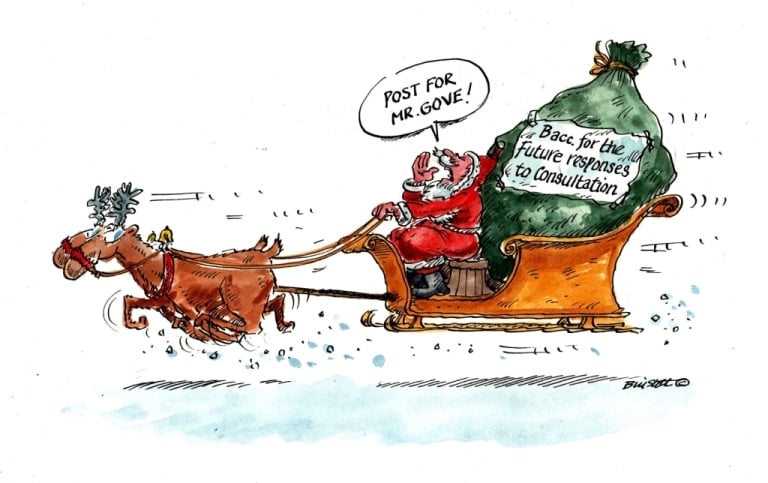
Seeing sense
Henry Vann looks back over a busy year since the Government announced its plan to create English Baccalaureate Certificates.
The Bacc for the Future campaign was founded by the Incorporated Society of Musicians (ISM) in September 2012. We started the campaign when it became clear that the Department for Education was intending to make only the English Baccalaureate (EBacc) subjects count towards a pupil’s success − maths, English, history, geography, languages (ancient and modern) and sciences.
The big win occured five months later in February this year when Michael Gove announced that he would halt his plans to create new English Baccalaureate Certificates (EBCs) and would introduce an accountability system for schools, which would take creative subjects, such as music and art & design, into account. Had this U-turn not happened, we would not have an eight-subject measure counting towards pupils' success, but would have a measure that only counted the EBacc subjects. This would have been devastating for the arts.
The ending of the EBacc accountability measure brought us back from the brink and showed the creative sector what we can do when we act together
The success came after a tough campaign, which included concerns raised by Parliament’s influential education select committee and objections from Ofqual, the qualifications regulator. It would not have been possible without the support of COG Design, the Design Council and #IncludeDesign campaign, Heads for the Arts, the National Society for Education in Art & Design, Dance UK and Shakespeare’s Globe, plus the thousands of individual supporters who backed the campaign and wrote to their MPs.
The ISM is the largest subject association for music educators and the professional body for musicians. Over time we have built a campaign through a website, petition and collaboration across the whole of the creative industries and education sector. We employed an excellent campaigns consultant, Jonathan Smith (now working at The Fairtrade Foundation).
The first big milestone of the campaign was the consultation which ran through November and December 2012. On the day the consultation closed, the baccforthefuture.com website had received over 16,000 hits from supporters and over 5,000 responses were received to the consultation – over 3,000 from individuals. It was noted in the Government's eventual response in February 2013 that the “majority of responses… received from people defining themselves as ‘an individual’ is a result of the text in a template letter used by one of the campaigns that was run in response to the consultation.” This was a sure sign that the campaign was successful.
The second big milestone took place in January 2013. As debates took place in the Houses of Parliament we worked with the National Union of Teachers, National Association of Head Teachers and #IncludeDesign to hand in a letter to Number 10 Downing Street with the backing of over 100 creative industry and education organisations. The campaign almost seemed lost when Michael Gove announced on the same day that the EBacc would be expanded to include A levels. We kept going, despite some leaders in the arts sector saying that the campaign was a lost cause.
But by the start of February we had over 45,000 individual signatories to the campaign writing letters to their MPs and the backing of Julian Lloyd Webber, Tasmin Little and Nicola Benedetti, Jonathan Ives and Stella McCartney, among others.
The campaign received coverage in ArtsProfessional, The Guardian, The Times, BBC, The Evening Standard, Daily Mirror, The Stage, Metro, Music Teacher, Design Week, a-n News and Music Week alongside countless other publications. Sister campaigns #IncludeDesign and What is EBacc? all built up pressure, supported by groups like the Cultural Learning Alliance, What Next? campaign group and Arts Council England.
Finally, as the education select committee announced that the government was trying to do “too much too fast” we succeeded together in securing a welcome decision by the Secretary of State to halt the EBC and EBacc plans.
So where are we now? The ending of the EBacc accountability measure brought us back from the brink and showed the creative sector what we can do when we act together. Do not believe anyone telling you that EBacc subjects are more frequently ‘required’ for university. Put simply: there is no evidence that supports the choice of subjects in the EBacc and there is plenty that disputes it.
There is more for us to do though. The EBacc league tables still exist, the Russell Group is failing to challenge the misuse of its own reports and Ofsted – despite the lack of evidence – has also started to favour the EBacc subjects. The ongoing GCSE reforms must not devalue creative subjects. Creative education is the lifeblood of our world-beating, economic recovery-leading creative industries.
Henry Vann is Public Affairs & Policy Officer at the Incorporated Society of Musicians.
www.ism.org
@ISM_Music
Join the Discussion
You must be logged in to post a comment.